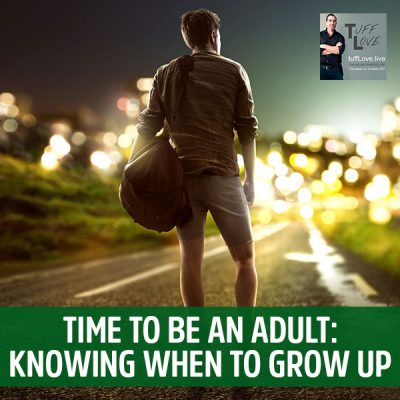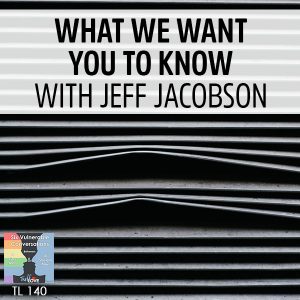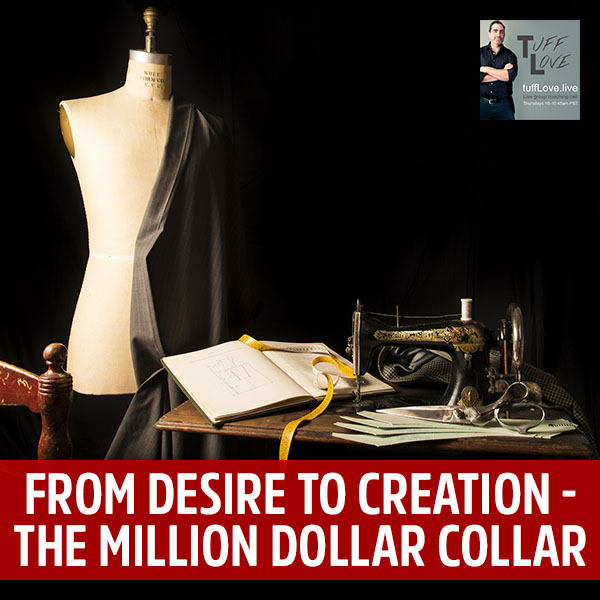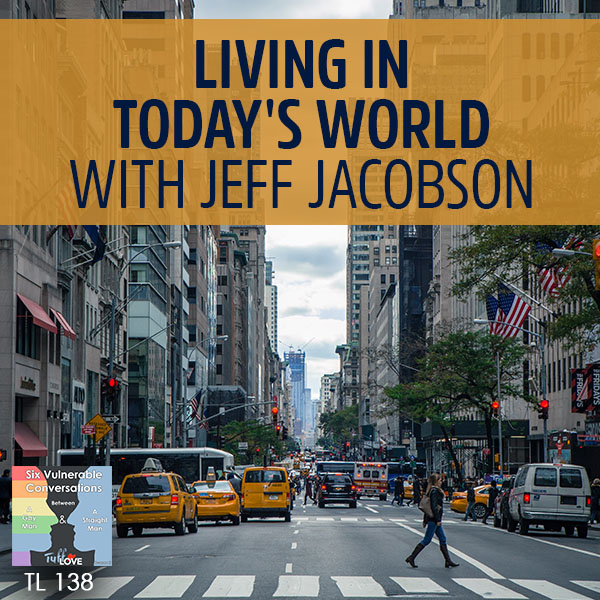
122: Six Conversations 2.4 – Cultural Taboos: Sex, Older Men & Exploring
Mar 23, 2018
What is a taboo and what taboos specifically exist for women? Arielle Brown and Jamie Thompson answer this question as they talk about cultural taboos for women’s sexuality. They explore the concept of sexual relationships with older men, sexuality and attraction with other women, and why it is so important to dismantle taboos. The places where we have shame for our sexuality is only when we don’t claim it and come into full ownership over it that it can have power over us. They share that to dismantle this personal taboo will dismantle its power over you. Learn how to dismantle these taboos to fully embrace your sexual curiosity and desires.
—
We are here with Six Vulnerable Conversations Between Two Women. Are you enjoying this series of two women speaking the truth, speaking what’s on their mind, and educating the world about what their thoughts are around some of their deepest, most intimate secrets? This show continues the flow of the previous episodes talking about sex, taboos, women’s taboos. They go into a bit of magic. They go into a little bit about older men. It’s a great show and I hope you enjoy it. For more shows, including some more Six Conversations, please visit TuffLove.Live.
122: Six Conversations 2.4 – Cultural Taboos: Sex, Older Men & Exploring
Welcome to episode four of Six Vulnerable Conversations Between Two Women. This is going to be super rich conversation. Me and Jamie are so excited to dive into this topic together. For those of you who are joining us for the first time, this is Six Vulnerable Conversations Between Two Women where we explore aspects of culture and connection and intimacy and relationship that, truth be told, all of us genuinely want to be having but hadn’t been given a framework for how to have these open, vulnerable, connected dialogue. Jamie Elizabeth Thompson and I are both intimacy-relationship-desire coaches who are here to open up this conversation and hope that you will join in the second part of the conversation with your thoughts, your questions, and your curiosities.
For this episode, we are going to be talking about cultural taboos for women’s sexuality. We’re going to start to explore what is a taboo and what taboos specifically exist for women. Why is it so important for us to be looking at these taboos and starting to dismantle them? How can we have these super important, super dynamic, super rich conversations with our partners and friends and lovers in such a way that we are received and heard? We also learn how to handle rejection in that process. Jamie, thank you so much for being here. How are you?
I’m doing well.
The first question I’d love to ask you to give a framework for the rest of our conversation is what do you consider a taboo to be?
For me, taboos are anything that’s in the shadow, anything that’s not allowed to be okay. Getting married and having sex with your partner and having babies is not a taboo, but having sex with someone or multiple people before you’re married is a taboo to some people. To some people, it’s not. It’s very subjective depending on what our interpretation of what is wrong and what is right. Taboo inherently comes from the dualistic perception that there is a right and a wrong. Taboo is the creeping over the edge into the wrong. There’s a world of wrong and taboo can be anywhere flirting with that line.

Cultural Taboos: Taboo inherently comes from the dualistic perception that there is a right and a wrong.
I love that piece around taboo which implies that we’re going into a dualistic, that there is a right and that there is a wrong. It’s a great place to explore. I remember looking at the dictionary definition in Webster’s dictionary and it said, “A taboo is something that has been known to have magical powers,” which was such an interesting thing to see in the dictionary. I’ve found that a taboo is something that has a lot of power. Simultaneously, there’s a lot of fear associated with touching that thing and a lot of shame around any desire to have a connection with that thing.
Taboos can be different for different cultures. For example, an interesting taboo for many spiritual communities is money. The desire for money is a taboo thing in many spiritual communities. Anger might be a taboo for a lot of people. To be able to express anger is something that’s taboo and to actually find goodness in the expression of anger. Do you want to add anything to that?
I love the piece about the dictionary defines it as touching magic. I feel like that’s what we want to uncover. How can we dive into the taboo in such a way that creates integration and transmutation into our lives so that there’s more aliveness, more turn on, more magic that we are giving permission and approval for?
Why is it so important for us to dismantle taboos? I was writing a lot very outwardly about my sexual experiences. It’s very in-your-face, talking about experiences like anal sex and things that have so much charge because I felt such anger around the taboo that exists around women fully claiming their sexuality. I just wanted to create a space where I could talk about anything. I remember coming to this place of to dismantle the personal taboo also dismantles its power over you. It makes me think of Game of Thrones. To me, this is an excellent example of dismantling a taboo. There’s an imp, a little person, who gets a lot of shit from everyone around him for being a little person.
He’s having a conversation with one of the main characters who is a bastard and there’s all this shame around him not being an actual heir of the throne. The imp was like, “The only way that you can dismantle the shame that this word has over you is to totally claim it.” It’s the same thing with our own taboos. The places where we have shame, like for our sexuality, it’s only when we don’t claim it and come into full ownership over it that it can have power over us. That’s been a place that I’ve been exploring a lot with taboos.
I want to dive into that a little bit because there’s claiming and there’s self-permission and then there’s owning it. Then there is a subtle thing that can happen where there can be also an indulgence and an outward need to get something from the external world, some approval. Part of the reaction to feeling caged is to rebel and it’s to even become compulsive and impulsive and wear it around. I see this a lot and I’ve lived it as well, of not wanting to be in this puritanical box necessarily that I grew up in. I’m going to be a fully sexually liberated woman. That, for me, created a greater distance between the truth of my true sexuality and a greater self-abandonment for a period of time than I even had initially.
It was a part of my journey but I see a lot of people going through that. It doesn’t necessarily mean posting naked pictures on the internet means that you’re doing this. It can be a part of that. Sleeping with people or exploring polyamory doesn’t necessarily mean that we are diving into this external validation place, but it can. Many times, what we are looking for in the outside world is a self-validation for our own sexuality. If we can begin from that place of self-permission for having this wild desire that I have and then lead from that instead of trying to get our liberation from the outside world, then we get to experience the process as one of self-love.
I feel like I did that very thing. I felt so closeted around my sexuality that I’ve felt like not only did I need to express myself, but it was almost like this, “Fuck you,” like just receive me. I can look back on that and there can be a part of me that’s like, “I did that,” and simultaneously realizing that I needed that process. Maybe it could’ve taken form in a different way. Let’s say someone’s reflecting right now and being like, “Fuck, that’s what I’m doing right now.” There’s a calibration process. If we spent a very long time polarized on one end of the spectrum, one of the most organic ways to find the middle ground in the calibration is to explore the other polarity, so you can swing your swing here.
Then, you find that place in between that’s authentically us. If one message can be conveyed throughout the course of this entire conversation is that the release of shame for our process and the experiences that we have is one of the most important things that we can do for our growth, for our healing, for our joy, and definitely for dismantling taboos.
I went on a similar process. There was definitely a big “fuck you” specifically to religion for me. My message around this is we’re doing it because of something outside of our self, then allowing that to be a mirror back in and just continue to look at where is this coming from. Just be aware. It’s not like there’s anything wrong, but just noticing along the way. It’s like there is a pendulum and it goes back and forth. Then we can find our natural rhythm with it that’s from an internal place instead of from, “Fuck you for telling me that I can’t be a sexual being,” and then, “I’m shameful because I went too far.” We’re going to fuck it up and we’re going to make mistakes. We’re going to go too far. There’s been specific times where I’m like, “I went a little too far with that,” and found my own boundary of what feels good to me and what doesn’t from the place of being willing to make the mistake and then finding what actually felt good or not in my own body.
[Tweet “Many times, what we are looking for in the outside world is a self-validation for our own sexuality.”]
It’s experimenting. We’re experimenting with how we inhabit ourselves, our bodies and our realities. I know for me, one of the most important piece has been finding people who are inhabiting themselves in such a way that I respect so that I don’t feel like I’m doing it alone and that I’m not alone. The piece around finding our resident community as we’re in our growth processes is a powerful piece to add in there. I would love to move into the bulk of this conversation, which is the taboo for women. There can be different taboos that exist for women than for men.
For example, if we’re going heteronormative, for men, a taboo might be to be super vulnerable. That’s the edge for men in modern day America to be sensitive, to be vulnerable because there’s such a current lack of approval by common social standards. For women, the taboo that we’re still working with is sex, our sexuality. One place that I went to get ready for this conversation was starting to look into the origins of that. We’re going to open up like a little wormhole to go into where we feel this comes from before I bring it back to present day.
I haven’t studied immensely about the Salem witch trials, the burning of the witches way back when. However, the things that I have read were witches were burned for their conducting of magic. I remember when I was in intro class in college many years ago, I was reading this drugs and behavior book and there was this one little snippet that described how the witches of the Salem witch trials brew their magical potions. The way that they would ingest it into their bodies was to take the magical potion and slather it on their broomstick and straddle the broomstick and absorb the psychedelic potion through the membranes of their vulva.
To me, it was like, “There is this connection between a woman’s sexuality and her magic.” What we see throughout the centuries and throughout the decades is not necessarily women being persecuted for their weaving of magic, because magic these days is also trivialized and stigmatized, but stigmatizing of women’s sexuality and their intuition, which in tandem are so intimately linked with a woman’s ability to weave her magic and her power in the world.
Part of what is happening here is there’s this idea of the power struggle between the masculine and the feminine. During the witch trials, women were finding their power. It’s easy to be like, “That’s amazing.”What was happening is something similar to what we see happening now, except the opposite. Women were using some of their power in a way that wasn’t supportive of men. There was a little bit of the same power struggle that we see happening now. Part of the genocide of this magic and of women’s sexuality was men were afraid. They were scared of it.
I can get that there’s a fear of it. What they did with that, there’s a lot to be said about that with murdering people for it, but that’s where it came from. They were afraid of the power that lived in between the woman’s legs because that’s where it originated, in the womb wisdom and in her femininity. Systematically, over the last several hundred years, it’s been a shutting down of that power, a shaming of that power because of the fear of it. A question that I like to ask myself as a woman is, “How am I going to use my power? Am I going to use it to manipulate? Am I going to fall into the trap of wanting to get my power back? Or am I going to ultimately allow it to lead and facilitate greater growth, love, experience, and fun and letting go of these taboos?”
Here’s where the circle comes in because I remember asking myself this question several years ago, “Why am I so afraid of my power?”I was like, “Because I don’t trust what I’ll do with it.” What I realized is that in order to trust myself, I need to start finding approval for all of the things that I desire but currently judge or hold shame for. If I’m judging the things that I desire, then I don’t trust myself. I need to learn how to trust myself here, which means starting to lean up against some of my own personal taboos. In this case, it’s things that I have a natural inclination for that for whatever reason I don’t feel are okay. What are some common modern-day taboos that women in the audience might be experiencing? Jamie and I have our own personal experiences with this, so why don’t we open this up? Jamie, would you like to talk about the tattoo you want to speak on or shall I go first?
You go first.
When I was flushing into like, “What are my personal taboos that I, in some ways, am still working with because it’s a part of my immediate reality?”what immediately came to mind was the taboo of women being with older men. I know for myself, especially in the past five or six years, most of the men that I’ve dated has been between fifteen to twenty years older than me. My current partner is sixteen years older than me. It’s funny because in this relationship, I don’t even think about the age difference. It’s like, “This is just my partner, and this is just what it is.” However, there is some taboo that exists for a woman choosing to be with an older man and all the stories that can emerge around that.
I know one of the simplest ones is like the older man is taking advantage of the younger woman, which is funny because I don’t feel that at all now. There’s some judgment that exists around that with the dynamic between a younger woman and an older man. When I think about it, my actual current edge at this point is being with younger men. I find that I feel a lot safer with older men. I trust older men more not for some reason because the culture that we live in doesn’t teach people our age how to have real intimacy and real connection. I trust older men because there’s more time put in. There’s more depth that I tend to find.
What I’m hearing is you expressing what your desire is. There’s this automatic thing that happens that’s like, “Is it okay to want this and to want this out loud? Is it okay to think older men have more depth in my experience and that’s what I want?” That’s an edgy thing to say and that is where we go in and begin to trust what our desire is and that it’s okay to have it exactly as it is.
That’s not unilaterally true. There are plenty of younger men who have a whole bunch of depths. Then I start going into the places where it’s like, “Where is this judgment, Arielle? Where are you blind spotting right now?”It’s like the spirals that I can go into. I have a desire, and this is what the truth of my reality is right now. I can either have judgments for it or I can have total approval for it and trust that it’s exactly what it’s meant for me in this moment.
That’s key because we don’t know what that something is until we go right into it, roll around in it for awhile, and face it. I feel like at that point, we can almost recalibrate. What comes up for me especially as someone who has done a lot of work in my own personal life and sexuality, I will go into the analysis of why I’m doing something before I fully go into it. The analysis is never the same as the experience. When I fully go into it, there’s an understanding that occurs. An example of this for me is being with a woman. Two years ago, I entered into a committed relationship with a woman.
It was the first one that I’d ever had and I had no idea what I was doing there. It was not a logical conscious choice of like, “This is something I want to do.” It felt like the thing I needed to explore. Coming out on the other side of it, I’m no longer in that relationship, it shed light on so many things that I needed to learn by being in that exact experience that I could not have learned from a book, I could not have learned from analyzing why I would want to be in that experience. It came from the actual experiences. It’s shocking the level of what came out of it for me. I wonder if it’s also similar for you with this with older men.
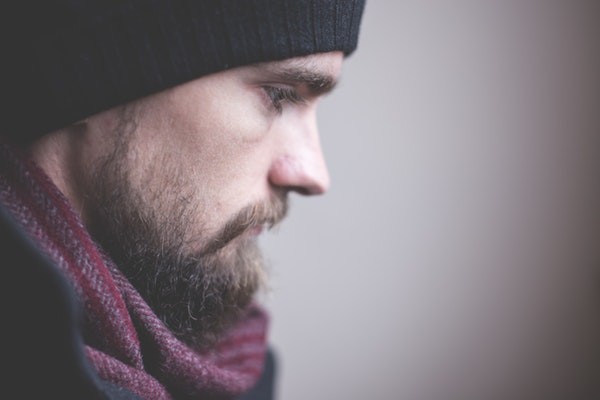
Cultural Taboos: Part of the genocide of this magic and of women’s sexuality was men were afraid.
For me, it was about approval for my feminine from another woman, I was able to explore my own femininity and experience so much approval because I didn’t have the projection that I had with men that wasn’t present. I could go fully into a completely new place without this fear of being judged for it. It was so valuable because now on the other side, I’m with men again and I am so different in relationship. My experience of myself in relation to men is so different because I don’t have the experience of needing approval that I used to. There was a cut of that that was still present. There was a cut of feeling like I wasn’t enough, like an apology. There was a competition happening. There were so many layers of things that were exercised through trusting the desire and going fully into the experience.
I appreciate the whole analysis versus experience because that’s a way that we can keep one foot out the door of fully immersing into the exploration of our experience. That’s the place that I find myself right now, really allowing myself to go in and being like, “This guy might not be the person that I’m going to spend the rest of my life with, but with all that being said, can I suspend belief and allow myself to fully be a “yes,”, to fully be here right now, and see what’s available when I don’t have my heels dug into the sand?”It’s a powerful place to be. I know you’ve talked about this before, being able to embrace the impermanence of things and act as though it’s here right now, and I’m going to be a full yes while it’s here.
You were sharing before about your experience of sharing your personal taboos and relationships. We’ve spoken a lot about what taboos are and how they can show up for us as women and human beings in general. How do we go about this process of dismantling them? It’s not a one-man show or a one-woman show. To dismantle our taboos, we need to go into the practice of being open about them with another human being. I’d love for you to share a little bit about that.
I have always enjoyed having sex on my period. I love it. It’s a time that I enjoy sexual experience. I had a boyfriend where I had my cycle while we were making love. I was like, “This is super hot.” I was turned on by it and his reaction was, “No.” He got up and left the room and stopped the interaction and was like, “I’m just not into that.” It was something that I didn’t have the skills, I wasn’t resourced enough in myself to handle it and bring forth my vulnerability about it. I did this thing where I shut down and said, “That part of me is not okay.”That was not a decision that he made for me. That was a decision that I made for me. I can look back and see it now. I did not know it at the time, but I systematically began cutting off the more edgy, taboo parts of myself. This person was a little more vanilla than I was.
What he thought was taboo was a lot larger of a pull than I did. It doesn’t mean that there can’t be still a meeting. We were together for a long time and it was a great relationship except for this thing. This was something that I never brought up until one day, I freaked out. This is what happens when I had repressed it so much for so long that one day, I lost it and all the fury of the feminine was upon him. I was like, “You don’t see me, you don’t accept me,” and all of this projection. He had no idea what I was talking about. I was like, “Do you remember that time six months ago when we were having sex and I got my period?” He was like, “Yeah.” It doesn’t even exist for him as a problem.
I bring this up because when faced with something like this now, I feel there are a few elements that I bring in. The most important one is vulnerability and bringing in the sting and bringing in the vulnerability of I just felt really shut down. I’m feeling like my sexuality is shutting down and bringing that up as a conversation was also taking responsibility for that. That’s my shutdown. There’s a way in which things can be negotiated when someone realizes that it’s actually important. He actually said that, “I wish I knew that this was so important to you. I could work with it.”When we love each other, we’re willing to see how we can push that boundary, but we have to be willing to bring that vulnerability in a space that might be challenging and uncomfortable.
Thank you for sharing that because when you said, “I like to have sex on my period,” that’s like an edge to me because I don’t like to get messy. I don’t like being messy in that way. My current partner, he enjoys going down on me on my period, so it’s a very interesting being with the part of me that’s like, “Is this okay?” Obviously, it is okay because he’s down there, but it’s an interesting place to play. The other piece you were sharing is how we can feel like we’re not allowed to say these certain things in our relationships because we know that we would be totally rejected and totally may have wronged.
The problem is when we hide these things. Often, we’re not even hiding things based upon what’s true but based upon our projection of how we believe the person will respond. What winds up happening is we build these relationships based upon like, “I’m not allowed to say this because he won’t be okay with it,” or “I’m not allowed to say this because she won’t be okay with it.”Then we can get to this breaking point when in reality, if we were transparent and real time about the things it might be that we both have mutual desires.
I believe this is one of the leading causes of infidelity and cheating. It’s having desires that we feel are wrong in some way that we don’t share. I’ve seen it in couples that I’ve worked with where there’s something that they have a desire for, that super edgy to share, because wanting and being seen in wanting is super vulnerable. It’s edgy to share and it’s easier to separate and say, “No, you’re the one I love, so I’m going to go splatter my desire all over this stranger because then I know that I’ll still be loved by you when I come home. I don’t want you to reject me. I don’t care as much about them because that’s not as close.”There’s this element that I love to bring in with couples as well. This is something that can be started very early on in the dating process as well, of naming and having approval for the desires that we have.
It doesn’t mean that we do everything. It doesn’t mean everything gets done. It’s just in letting it come through and be seen and not repressing it. What had happened for me is, because he had a reaction to one desire, I started repressing all of the desires that I judged that he wouldn’t want. When we ended up talking about it, about 70% of them were already a “yes,” but I had judged all of this. We had an honest conversation after I freaked out and was yelling.
What I’m hearing you saying is it’s so important for us to have approval for what we desire regardless of whether or not it winds up being physically actualized. I had a conversation with a couple where the man was sharing a story of the past around how he had this desire, and I could his partner next to him tighten up. He was like, “I don’t want to give that desire.”The conversation that I had with them was like, “How could we hold space for our partner’s desires without going into the fear of like, “I don’t want to do that”? This can especially happen with women when they’re receiving their male partner’s desires of like, “What if he wants something that I don’t want to give?”
[Tweet “The analysis is never the same as the experience.”]
What happens is when we receive our male partner’s desire, we’re not holding space for their desire, but we’re immediately going into the reaction of how we feel about that. The challenge here is that we transmit that rejection and it’s so easy for the partner to take it as like, “That desire is wrong,” when in reality, there’s nothing wrong with the desire. We have our own feelings about whether or not we want to be a “yes” to it. One powerful practice for couples is to create a space where we know that we don’t have to be a “yes” to a partner’s desire, but how can we support our partner and releasing shame around what they want by being able to receive it, hold space for it, and validate it.
It’s almost like there’s a “yes.” The first step before ever taking action or even talking about taking action on something is receiving it. Having a “yes” for whatever their desire is as something that exists for them. Then it’s bringing it over here and seeing, “How can I and is this something that I have a desire to explore with them?” That’s step two. Taking action on something is step three, but the first step initially is having it be okay over there.
The thing that’s arising for me is that it seems like simple steps and what it requires is both people to be in touch with their personal boundaries, like what their “yes” and what they’re in “no” to and really trust in their ability to take care of themselves. When I talk to women’s, when it comes to opening up to being more sexual or more physically intimate with a partner, the thing that I hear over and over again is that, “I fear being a ‘yes’ to anything because I fear I’ll have to be a ‘yes’ to everything.”
To me, that implies a feeling of we’re not advocates of our own “yes” and “no,’ that we have to go on the ride of the other person who’s asking something of us because we feel like because they’re asking, we’re obligated. This assumption is a very dangerous one because it’s us assuming that we need to give our power away. If you’re someone who’s struggling with receiving your partner’s desires or this is up for you and your relationship really starting to explore like, “Where do I feel obligated in certain places where I don’t need to give that power away and that I am actually powerful enough to receive this person’s desire and hold it without creating a story about what I need to do?”
I had this idea at one point in my life that if I really opened up the door to what I felt was taboo and started exploring my dark desires, my super deep, private, sensitive desires, that I would somehow become insatiable, that I would be so hungry that nothing would ever be able to fill me. I was afraid of what was inside of that Pandora’s box, so I didn’t want to open it. Interestingly enough, that hunger that I began to explore initially became overwhelming in some ways. It was like all I want to do is have sex and be naughty and explore that darkness. It’s like a pendulum swinging over into like, “Am I ever going to be able to be a normal human again?”What happened as I emerged from that door of going into the darkness of my own sexuality, of my own taboos, was a different level of power, an ownership of, “This is what I want, and this is what I don’t want. I know because I’ve lived it,” and an experience of a deep intimacy with myself.
I don’t necessarily have to do all the crazy stuff in order to touch this part of myself that had me want to open Pandora’s box in the first place. It became an experience internally that there are all kinds of fun things that we can do and play with. There’s a lot of approval that I experience now for having what I might perceive as weird, dirty, and strange desires. Giving myself the permission to explore them feels good. I’ve seen in partners how it also gives them permission in a way that they’re so grateful. One of the greatest gifts that we can give to one another is to give you permission to explore and to experience all of your taboo and all of your darkness. I might not be a “yes” to diving into all of that, but I’m fully here with you doing the same thing.
We have this huge capacity for desire because it’s our life force. Our desire is that which propels us to our destiny in a way. When we’re tapped, our desire is a compass for where am I supposed to be going in my life and what is available to me, but unfortunately, we live in a culture that’s made a taboo out of desire. As a result, we have these water hoses full of desire that we’ve pinched. What happens is when we start to take the clip off a bit, it’s not a steady flow. It’s like you’re trying to hang on.
What happens as we let all of it out, not all of a sudden, but eventually what happens is we gain composure and command over the hose. We allow our hose of desire to water over these flowers. It’s a process. If we are unwilling to unleash our desire for figure that it’s not going to be a perfect unfoldment, we’ve shot ourselves in the foot before we’ve even given ourselves the opportunity to learn how to walk. That’s what we’re doing. We’re children in many ways learning how to work with desire. It’s a process of growing up into our adult relationship with desire.
That’s the experience of it. We can be afraid of it and we can still go into it any way. There can be a lot of fear and a lot of what ifs. The analysis before the experience never works. It’s when we fully go into whatever these desires are and face them, then we have a lot more understanding of what they are, what they aren’t, and then what we want moving forward. It’s such a great and fulfilling journey to be on when we can move and pierce through that fear a little bit.
I’d love to give the opportunity for some people who have something to say or a question to bring on to the conversation. I welcome you to unmute yourself and bring your voice into the room. If you prefer to stay anonymous, you can just keep your name to yourself. Who’s going to be the first one?
I’m just checking in with my body. Talking about this brings up so much and I just want to hold some permission and approval for that. If it’s like, “This is a lot,” that that’s okay. It can even be healing to say that if that’s what’s so.
I invite the audience to realize that to an extent, we’re explores. This is not the norm and the fact that we’re even having this conversation puts us into a percentage demographic that is a minority. It’s okay that we don’t have all this figured out. It’s okay that we’re messy. If we can remember that we’re on the leading edge of this new way of relating, it can give us way more approval and permission for our process and for our discomfort. If you have any thoughts, I invite you to bring your voice on.
I’ve done more open floor dancing and started to engage with several of the men there. I’m ‘72, so it was brought up in a very you-don’t -do-that-in-public kind of way and I so enjoyed it. I loved every minute of the driving and one man lift me and it felt fabulous. It felt like a very safe place to be doing that. I’ve been longing for that physical touch since breaking up with my boyfriend that six months ago. There was a backlash afterwards where what I call old self was saying, “Shame on you.”
I am so full, happy and turned on hearing you say that. I love that you’re exploring and that there is no age where that’s over. I’m inspired by that. Something happens sometimes, I call it an intimacy hangover where there’s an experience of like I pushed outside of my comfort zone. What that means is my analysis is coming in and I’m making meaning about what that means about me. That can happen after that. It can also be like maybe I went a little bit too far. Maybe there was some piece that next time I want to dial back a little bit. There can an incremental growth and it’s like the firehose that Arielle was talking about.

Cultural Taboos: One of the greatest gifts that we can give to one another is to give permission to explore and experience all of your taboo and darkness.
Sometimes when we turn the full firehose on, when I turned my full firehose on in a new way and it runs away with me, I’m grasping for the table and the ground and trying to find myself again because my identity is reorienting. It’s something to be aware of, and yay for you for having that experience. It’s always a process of calibrating to what level feels good for me to be intimate and explorative and what does it feel like the next day and sitting with those emotions and finding the place that works.
One thing I’m finding useful is when that shame voice comes in, I’m just saying, “Don’t mess with me,” because it felt like the most natural thing in the world to be doing that, dancing with these men. It was such a beautiful dance. One of them was married, wearing a wedding ring. This goes beyond my suburban Long Island, but it felt so right in that confined space.
I’m connecting with more and more people who are doing conscious dance work and seeing how this is such a powerful place for us to work with our desire and our impulse and boundaries in a way that we can bring our sensuality and our life force out knowing that it’s in a container where it doesn’t have to lead anywhere else other than a dance. It’s such a beautiful place to practice.
Thank you both for the honesty that you’re bringing to us. When I was growing up, there was no opportunity to talk about any of this. It’s fabulous, what’s happening. It’s so empowering.
Thank you so much. One of the thing that arose in me is that these voices that like, “I’ve done something wrong,” so much of this is it’s not that we’ve done something wrong, it’s just a script that’s been running so long that it’s like the habit. For me, this is still an area of growth. My inclination as an explorer and devotion to this work is when there is a negative story, I want to go deeper into what’s beneath it. Sometimes it’s as simple as a neuropathway that’s been groomed in over and over again. It’s time to create a new neuropathway.
Sometimes the simple thing is taking a step to the side as opposed to going deeper, which means creating a new belief and ingraining it as the new norm. When these beliefs had been holding us for 70 years, it’s not even like, this is true on why this exists, it’s just that’s what’s familiar. A big part of this is choosing different belief systems and creating new consistency to running those scripts in our minds and our bodies.
Sometimes growth is small and incremental and there’s a way in which we like having awareness around blowing yourself out. One time, I wanted to have a threesome, so we went and did it, my partner and I. It was not calibrated and we weren’t ready. Both of our systems were not ready to hold all of that energy because we didn’t do so with a sense of care and awareness around it. It’s something that I see a lot in the sexual liberation movement. It’s like, “Just go do it.”
You will create new neuropathways in doing that and there’s a way to check in with the internal system of like, “Is this going to fully blown me out or is it going to push my boundary a little bit in a way that feels healthy?”It’s holding two things that might seem polar opposite and having awareness around what’s going to have longevity and what’s going to bring growth in a way that my system can handle. Sometimes, you fuck it up and that’s okay. Are there any parting words that you’d like to bring, Jamie?
Sexuality is what gives life. We all are here because two people had sex. It’s such a sacred and fascinating realm to explore and look into what my life force is about. It’s at the root of our shocker system. It’s at the root of life force and what drives human beings. It’s a powerful energy and we are being driven by it, whether we know it or not. Bringing awareness to what is driving me, what my sexuality look like, tastes like, feel like, sound like and bringing the senses into it and bringing attention into it and creating it and using it consciously instead of unconsciously because it is driving. Sexuality is the most powerful driving force that exists in our world. It’s such a valuable exploration to really tune into.
[Tweet “Sexuality is what gives life.”]
Sexuality is sacred and our desire in that, our sexual impulse, is one of the purest things. It’s such a shame in some ways because modern culture smeared sexuality with a lot of stickiness, a lot of things that don’t feel good. At our core, our sexual energy is our creative energy. It’s our life force. It’s the thing that drives us to create. When we’re connected to our body and when we release shame, our desire and our natural impulse is one of the most beautiful, pure, organic things that we could connect to.
How do we strip all of the shame, all of the taboo, all these things away that make us feel shitty and disconnect us from like the purity of who you really are in our ability to create that for ourselves? I feel grateful that we are in a space and a time where we, as human beings and we as women, can be having these conversations and be received because it was not always so, and I love reminded of that.
Thank you everyone so much for tuning in. We’ll be back again next week at 10:00 AM Pacific Standard Time for our fifth episode of Six Vulnerable Conversations Between Two Women. Jamie, how can people get in touch with you if they want to learn more about coaching or your other offerings?
The best way to reach me is my personal Facebook, which is Facebook.com/MissJamieElizabeth. My website is RelationshipFlowState.com.
Thank you. For those who are interested in learning about my coaching work and offerings, you can visit www.ArielleBrown.com. Have a beautiful day everyone and we will see you next week, same time, same place.
Thank you so much for joining us with Tuff Love. Thank you, Arielle. Thank you, Jamie. I’m grateful for your contribution to Tuff Love and to the world. For more shows, please visit TuffLove.Live. If you feel so inclined, please go to your favorite app, Stitcher, iTunes or wherever you listen to your podcast and give us a little review. It’s helpful. Thanks so much. Take care and we’ll see you soon.
Resources mentioned:
About Arielle Brown
 Arielle is a Relationship Expert & Intimacy Educator. She specializes in helping people to create deeper connection and intimacy their relationships and greater community. In her private coaching work with singles and couples, she helps people create or revitalize relationships that are authentic to the needs, values and desires of each person. Her group facilitation and workshops focus on cultivating deeper levels of intimacy with others through conscious communication, energetic attunement and sensory awareness of the body. Learn more at www.ariellebrown.com.
Arielle is a Relationship Expert & Intimacy Educator. She specializes in helping people to create deeper connection and intimacy their relationships and greater community. In her private coaching work with singles and couples, she helps people create or revitalize relationships that are authentic to the needs, values and desires of each person. Her group facilitation and workshops focus on cultivating deeper levels of intimacy with others through conscious communication, energetic attunement and sensory awareness of the body. Learn more at www.ariellebrown.com.
About Jamie Thompson
 Jamie Thompson is an Erotic & Intimate Communication Expert and founder of Relationship Flow State. She specializes in creating a safe space for conscious couples to have open communication while exploring a new edge of passion, depth, and erotic flow. Jamie combines study of the Quantum Field, communication techniques based in Neuroscience, and somatic movement reprogramming with 10 years of coaching experience to help clients harness their erotic intelligence. She also has an online program to help couples and individuals become fluent in the four ‘Erotic Desire Languages’. Mention this podcast to be considered for a complimentary strategy session and receive a discount code for upcoming programs. Email support@jamiethompsoncoaching.com for details.
Jamie Thompson is an Erotic & Intimate Communication Expert and founder of Relationship Flow State. She specializes in creating a safe space for conscious couples to have open communication while exploring a new edge of passion, depth, and erotic flow. Jamie combines study of the Quantum Field, communication techniques based in Neuroscience, and somatic movement reprogramming with 10 years of coaching experience to help clients harness their erotic intelligence. She also has an online program to help couples and individuals become fluent in the four ‘Erotic Desire Languages’. Mention this podcast to be considered for a complimentary strategy session and receive a discount code for upcoming programs. Email support@jamiethompsoncoaching.com for details.
Follow Jamie on Facebook for more Exquisite Eroticism: www.facebook.com/missjamiethompson
Find out your ‘Erotic Desire Language’ on Jamie’s Website: www.jamiethompsoncoaching.com
Podcast: Play in new window | Download




